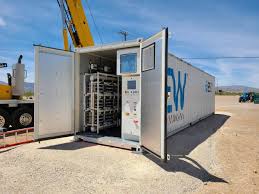In today’s fast-paced world, the demand for reliable energy storage solutions is higher than ever. As renewable energy sources such as solar and wind power become increasingly popular, the need for efficient and cost-effective ways to store this energy is growing. This is where containerized batteries come into play.
What are Containerized Batteries?
Containerized battery are energy storage systems that are housed in large, transportable containers. These batteries are typically made up of lithium-ion cells, which are known for their high energy density and long cycle life. The containers are designed to be easily transported and can be quickly deployed in a variety of settings.
Containerized batteries offer a convenient and scalable solution for energy storage. They can be used in a wide range of applications, from providing backup power to remote locations to stabilizing the grid during peak demand periods. These batteries can also be easily integrated with renewable energy systems, allowing excess energy to be stored for later use.
Benefits of Containerized Batteries
There are several key benefits to using containerized batteries for energy storage.
- Scalability: One of the major advantages of containerized batteries is their scalability. These systems can be easily expanded to meet changing energy storage needs, making them a flexible solution for both small and large-scale applications.
- Portability: The transportable nature of containerized batteries allows them to be easily moved to different locations as needed. This can be particularly useful in emergency situations or for temporary applications.
- Cost-Effectiveness: Containerized batteries are a cost-effective energy storage solution, particularly when compared to traditional stationary battery systems. The modular design of these systems allows for easier installation and maintenance, reducing overall costs.
- Reliability: Containerized batteries are designed to provide reliable and consistent power storage. The robust construction of these systems ensures long-term performance and durability, making them a dependable option for energy storage needs.
Applications of Containerized Batteries
ESS for industrial and commercial have a wide range of applications across various industries. Some common uses include:
- Grid Stabilization: Containerized batteries can be used to stabilize the electrical grid by providing backup power during periods of high demand or low supply.
- Renewable Energy Integration: These batteries are often used to store excess energy generated by solar or wind power systems, allowing for a more reliable and consistent energy supply.
- Telecommunications: Containerized batteries are commonly used in the telecommunications industry to provide backup power for cell towers and other critical infrastructure.
- Remote Power: In remote or off-grid locations, containerized batteries can provide a reliable source of power without the need for traditional grid connections.
Future Outlook
As the demand for energy storage solutions continues to grow, containerized batteries are expected to play an increasingly important role in the industry. With their scalability, cost-effectiveness, and reliability, these systems offer a versatile and efficient way to store and manage energy.
With ongoing advancements in battery technology and improvements in energy storage systems, containerized batteries are poised to become a key player in the transition to a more sustainable and resilient energy future.
In conclusion, containerized batteries are a promising solution for energy storage needs in today’s rapidly evolving energy landscape. Their versatility, scalability, and cost-effectiveness make them an attractive option for a wide range of applications. As technology continues to advance, containerized batteries are likely to play a significant role in shaping the future of energy storage.
Also Read
- ► 7kw Solar System Price in Pakistan: Everything You Need to Know
- ► Affordable Luxury: The Best Budget-Friendly Fragrances for Men
- ► Indian Visa from Cameroon: A Comprehensive Guide for Travelers
- ► Indian Visa for Czech Citizens
- ► Indian Visa for Latvian Citizens: A Complete Guide
- ► CapCut APK Download [Mod] Free Pro Editing 2025
- ► Instander & Honista APK Download For Android 2025
- ► INDIAN VISA FOR POLISH CITIZENS
- ► Indian Visa for Italian Citizens: Everything You Need to Know
- ► Indian Visa for United States Citizens: A Comprehensive Guide
- ► Affordable Oversized T-Shirts for Men: Top Picks for 2025
- ► Top 10 Grout Cleaning Services in the USA for Sparkling Tiles
- ► 6PM Season | 6PM Clothing Official Store | Up To 40% Off
- ► Transform Your Space with Stylish Bedroom Furniture at Blisswood Furniture
- ► Top IT Directory Solutions Recommended by Topfirms





